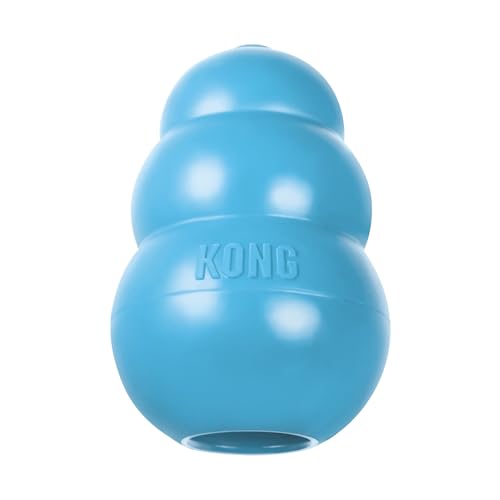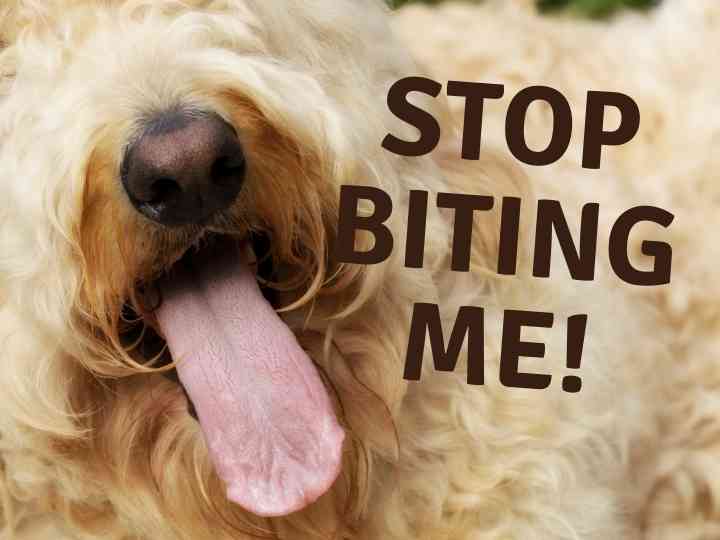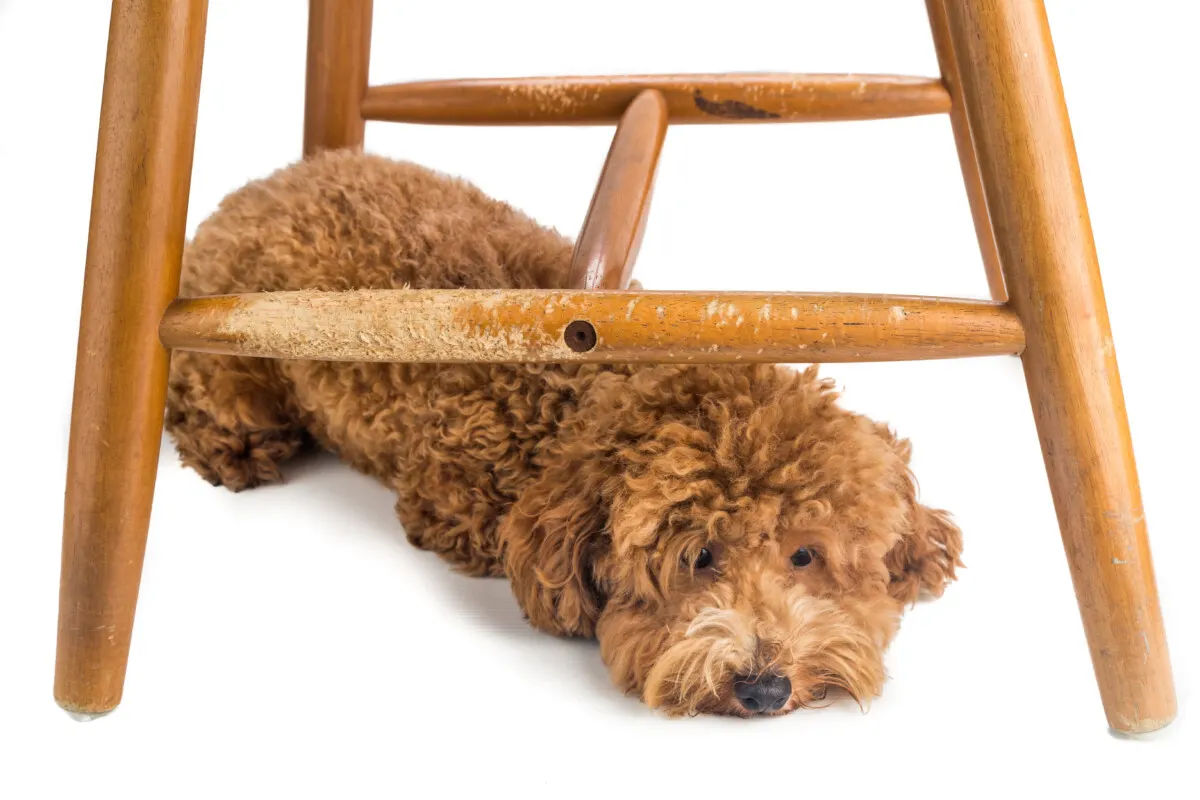When Do Goldendoodles Stop Biting and How You Can Stop It?
Goldendoodle puppy teeth are like tiny little needles. Even when they don’t bite hard, it can hurt! Luckily, puppy biting doesn’t last forever, and there are things you can do to help discourage your Goldendoodle puppy from putting their teeth on you.
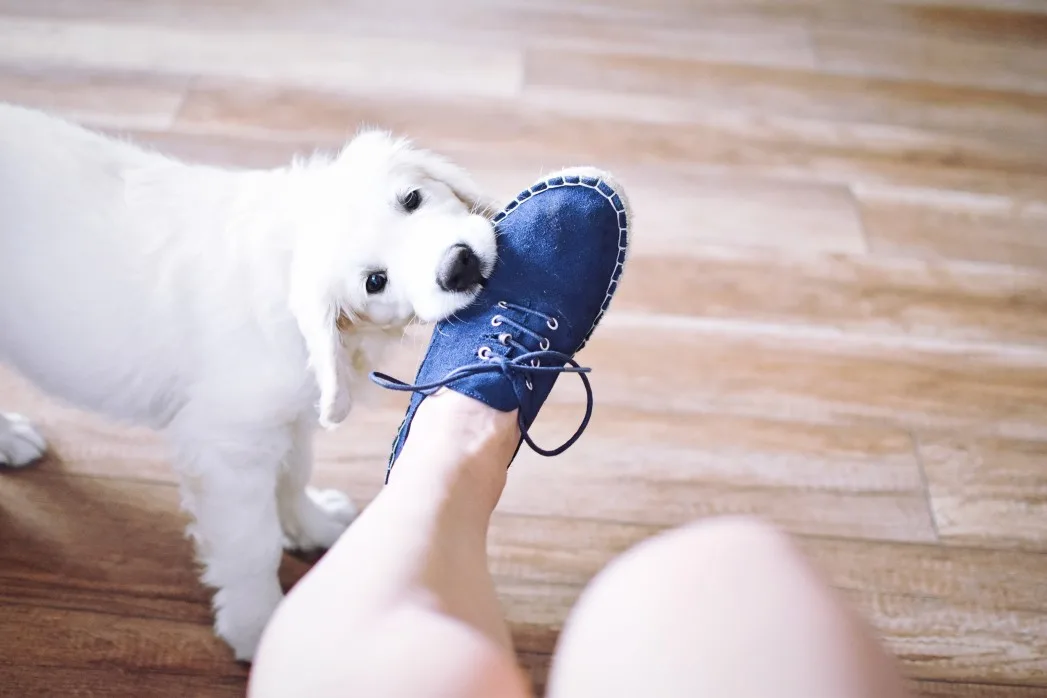
When do Goldendoodles stop biting?
Goldendoodle puppies have most of their adult teeth by the time they’re 7-8 months old, and that’s usually when most biting behavior stops. Teething, the process of losing baby teeth and growing adult teeth, lasts from about 3-4 months of age to 7-8 months.
- Goldendoodle puppy teeth can be painful, and puppies tend to explore the world by putting things in their mouths.
- Goldendoodle puppies usually stop biting when they are 7-8 months old when their adult teeth have grown.
- Goldendoodles are bred to retrieve things, and their mouthy tendencies need bite inhibition training.
- Bite inhibition training should involve the same method that puppies learn with their littermates. It involves a loud squeal, stopping the play, and ignoring the puppy for up to a minute.
- Play dates with other puppies can also help teach bite inhibition.
- “Drop it” training is useful and could save the puppy’s life in the future.
- Giving puppies frozen fruits, teething toys, bully sticks, and engaging them with chew toys can help deter biting related to teething.
- Different techniques are needed to manage biting when puppies throw “temper tantrums.”
Teething isn’t the only reason Goldendoodle puppies like to put everything possible in their mouth, but it is one of the most significant factors. Having new teeth pushing through your gums is uncomfortable, and chewing on things can help reduce that discomfort.
Tasting things is also another way that puppies explore the world. Without hands or opposable thumbs, their mouth is the best way to determine the texture and firmness of an object. Goldendoodle puppies are naturally curious, so they’ll put just about anything in their mouth to learn more about it.
Additionally, Goldendoodles are the product of two breeds that were bred to retrieve things from the water. Golden Retrievers and Poodles were both bred to collect birds that hunters had shot. That means a tendency to hold items in their mouth was actually bred into them.
Goldendoodles tend to be inherently mouthy, so you will have to teach your puppy to have better bite inhibition (reducing how much force they bite down with during play). The younger your puppy was when you brought them home, the more difficulty your Goldendoodle may have with bite inhibition.
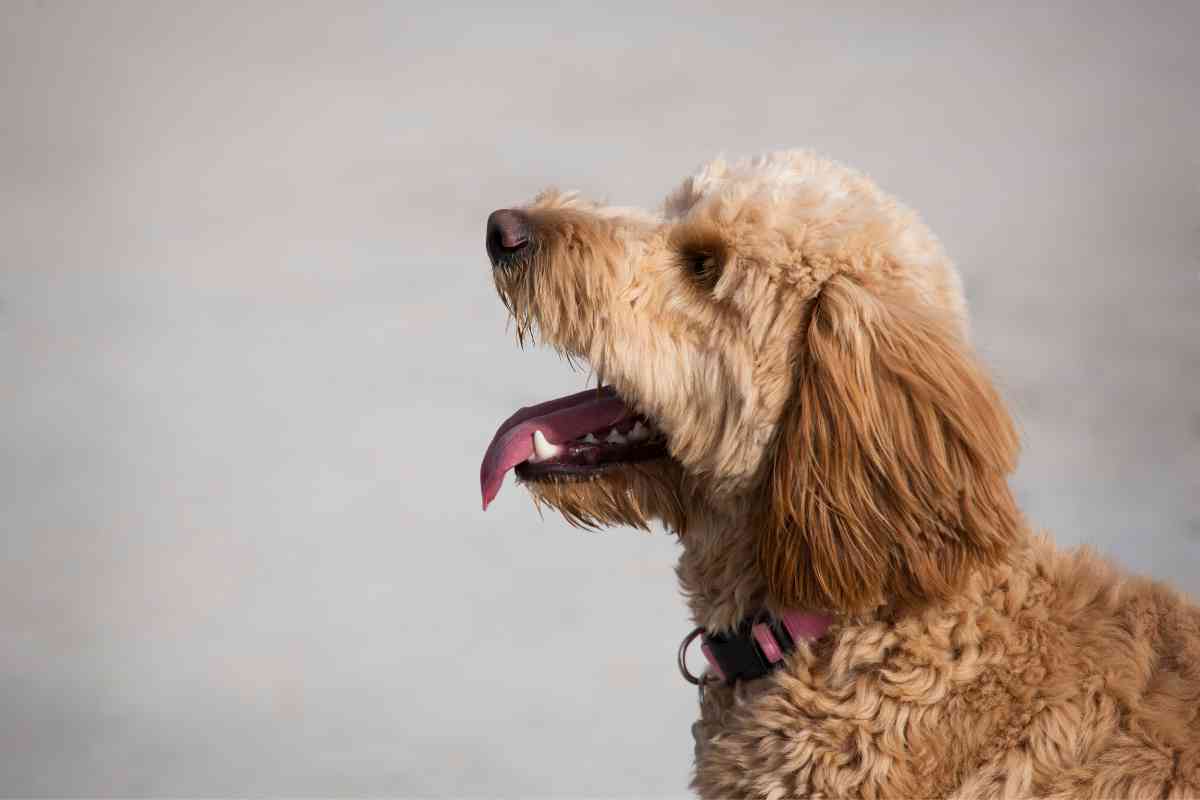
Teaching Bite Inhibition
When left with their littermates long enough, puppies learn that biting a playmate too hard causes the fun to stop. However, most Goldendoodle puppies find themselves in a new home before they’ve fully learned this lesson.
To teach your puppy bite inhibition, you have to do what their littermates would have done. When your puppy bites you too hard, squeal loudly, stop what you’re doing, let your hand go limp (don’t jerk it away suddenly), and ignore your puppy for up to a minute.
Anything else – yelling, bopping the puppy on the nose, continuing to play – reinforces the biting behavior. One reason puppies bite is to get attention, so giving it to them – even if it’s negative attention – reinforces the idea that biting gets them attention.
So next time your Goldendoodle puppy bites you, think like a puppy yourself. Squeal, stop, and ignore. It will take time, but eventually, your puppy will learn that biting makes the fun stop and doesn’t result in the attention they’re looking for.
Goldendoodle puppies usually have a good grasp of bite inhibition by the time they’re 5-6 months old as long as you’re consistent with the training.
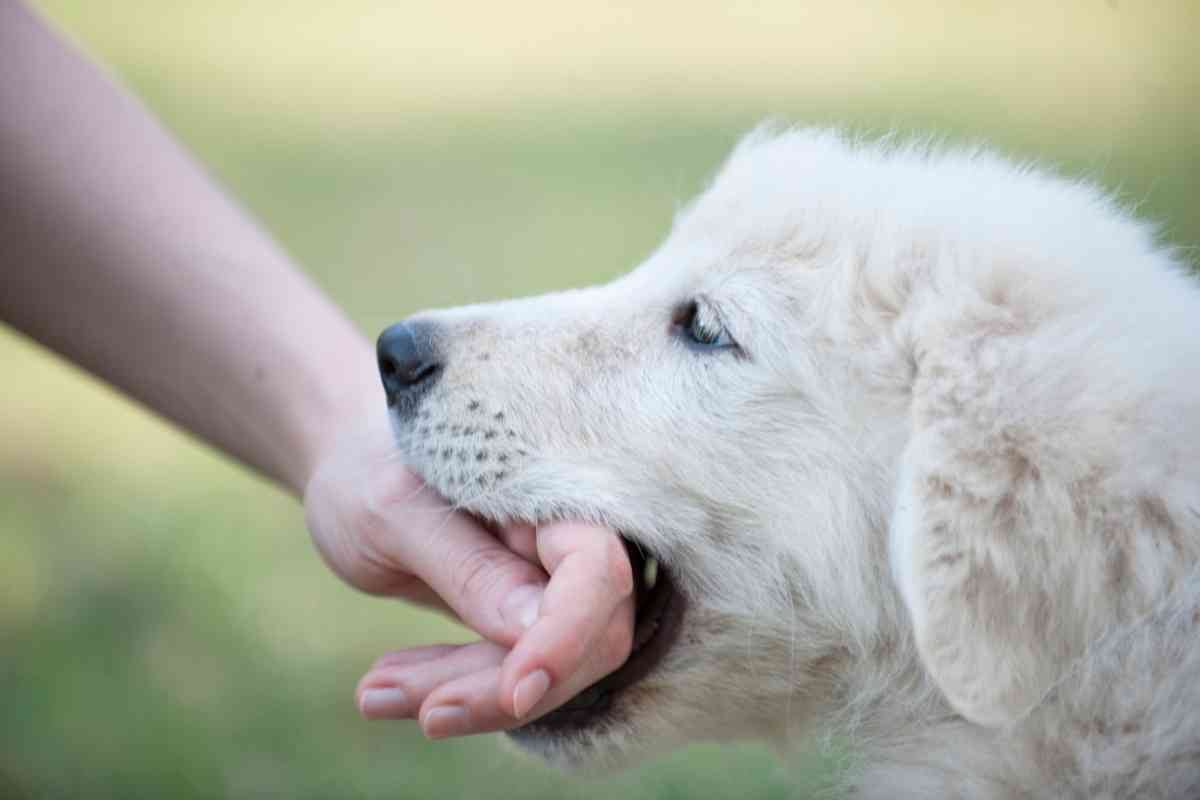
“Drop It”
Bite inhibition training is the perfect opportunity to train your Goldendoodle puppy to “drop it.” If your puppy tends to bite and hold on, tell your puppy to “drop it,” then immediately reward them with a treat and praise.
“Drop it” is a useful command for a breed that will put anything and everything in its mouth! It could even save your Goldendoodle’s life one day if you see them try to eat something dangerous.
Also, chasing a dog that won’t put down your keys or wallet is only cute in videos, not real life, especially when you’re running late for something.
You can reinforce “Drop it” training by encouraging your puppy to “drop” a toy in exchange for a treat.
Note: We use “drop it” all the time because Lexie loves to pick up the kid’s socks and carry them around. We need to use better “pick up” commands with our kids – lol!
Play Dates
Playing with other puppies is also an excellent way for your Goldendoodle puppy to learn bite inhibition. When they bite another puppy too hard, that puppy will let them know.
Make sure all puppies are up to date on their age-appropriate vaccinations before letting them play together.
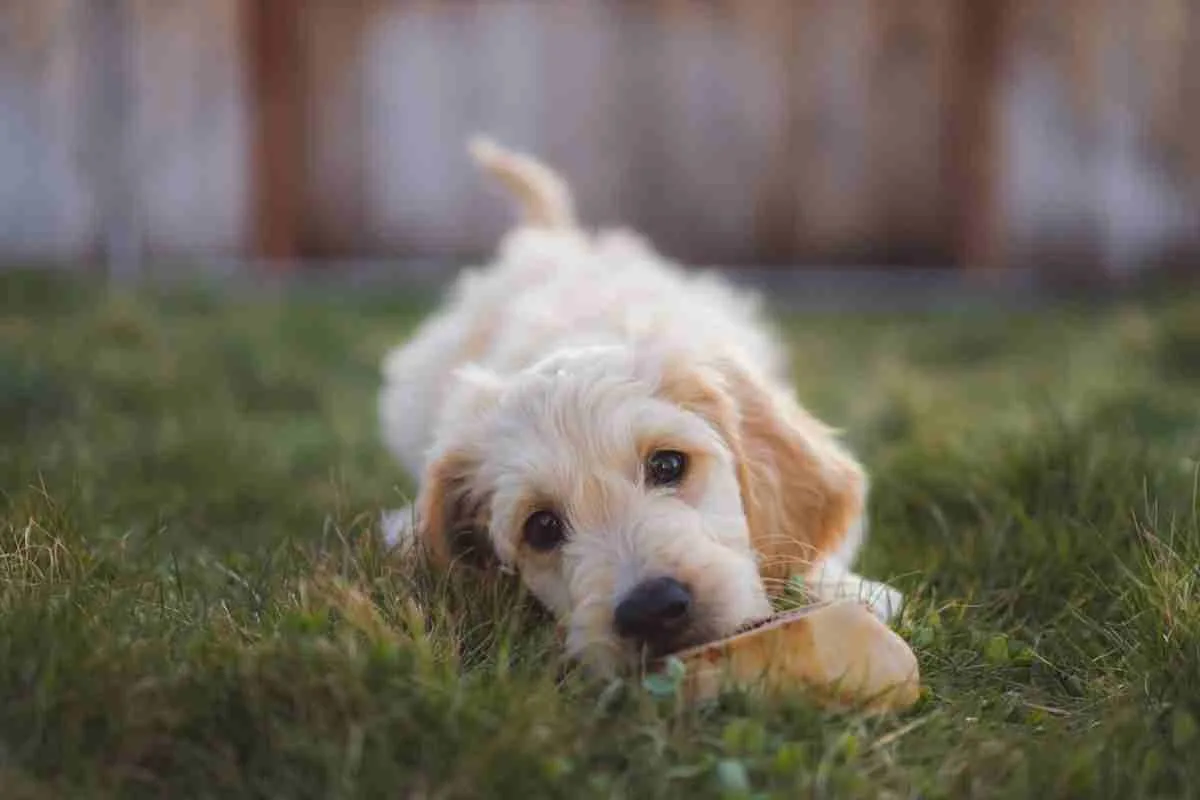
More Ways to Stop Biting
Not all biting is related to a lack of bite inhibition. Teething is a significant factor that causes puppies to want to bite and chew on anything possible. Here are some tips to deter biting that’s caused by teething:
- Give your puppy frozen blueberries, strawberries, banana slices, or carrots to chew on.
- Provide plenty of chew toys in different textures and shapes.
- Teething oil or gel can help soothe sore gums.
- Play tug of war with your puppy (gently).
- Fill a Puppy Kong with peanut butter, then throw it in the freezer. The cold will soothe their gums while they chew on the rubber, and working on getting out the peanut butter keeps their brain engaged.
- Give your Goldendoodle bully sticks to chew on while you are around to supervise. Bully sticks are a healthy alternative to dangerous rawhide, but puppies may swallow large pieces if left unsupervised.
Puppy “Temper Tantrums”
Your Goldendoodle puppy may try to bite you when you do something they don’t like, such as trimming their nails or brushing their fur. You need to use different techniques to manage this type of biting compared to teething or play biting.
With regular bite inhibition training, you’re trying to teach your puppy that play stops when they bite. When dealing with temper tantrums, the goal is to teach your puppy that the thing they don’t like will continue to happen even if they bite.
Instead of yelping like you’re hurt, try not to react at all when your Goldendoodle puppy bites you during a temper tantrum. Continue doing whatever it was you were doing before the puppy started to bite you.
One thing
your Goldendoodle puppy needs to get used to is brushing, so let’s use this as
an example. You’re trying to
Continue
brushing your puppy while they struggle. Try to get the puppy to bite the
If you stop brushing your puppy every time they bite you, your Goldendoodle learns that biting makes bad things stop. They’ll never get used to being brushed, and you’ll have to keep them clipped short and get them groomed often to prevent painful mats from forming.
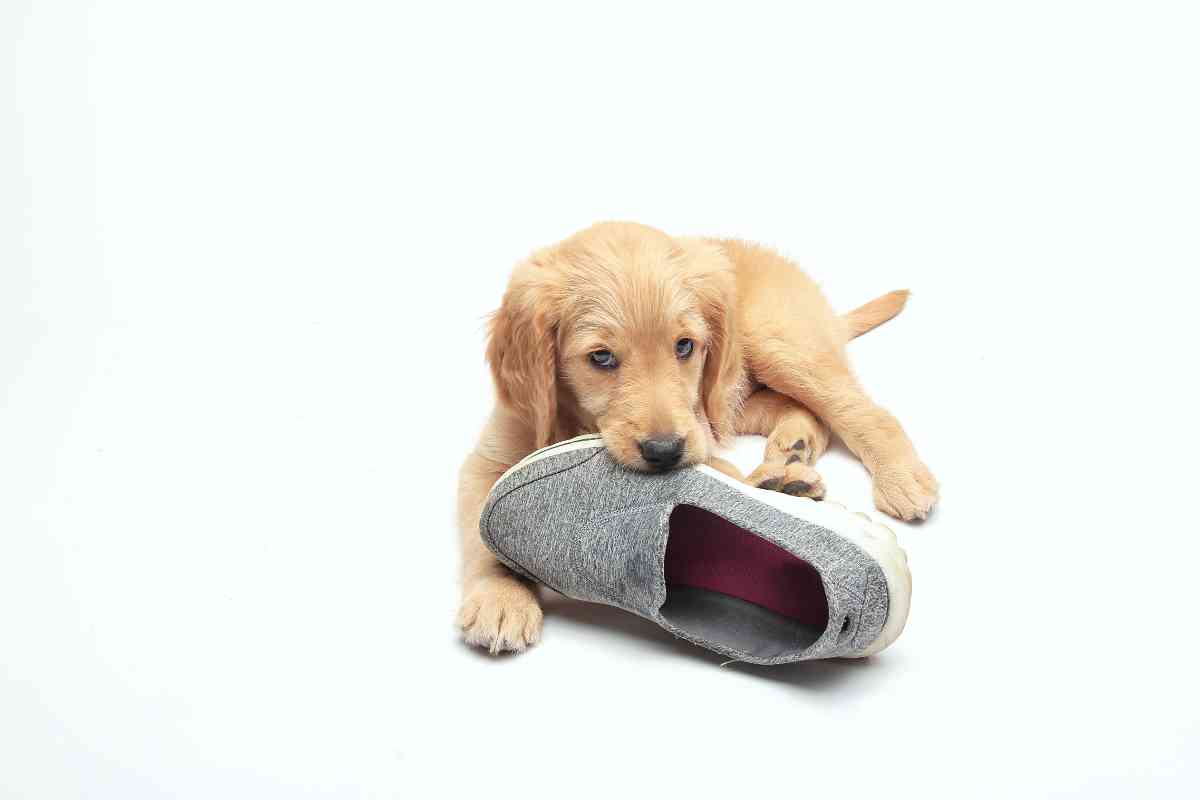
General Precautions
Here are some additional tips you should know about working with a biting puppy:
- Don’t avoid playing with your puppy out of fear of getting bitten. Play provides crucial bonding between a Goldendoodle and their people. The goal is to teach them to play nicely, not to discourage playing with you at all.
- Don’t wave your fingers or toes in your Goldendoodle’s face or slap their face to get them to play. These things are likely to encourage your puppy to bite your hands and feet.
- Hitting a puppy for playful mouthing can make them bite harder. It can trigger your puppy to play even more aggressively. It can also make your puppy fear you or create real aggression. Avoid all punishments that might hurt or scare your puppy.
- Don’t jerk your hands or feet away when your puppy bites you. That encourages your puppy to jump after the hand or foot and resembles play. Instead, make your hand or foot go limp so that it’s no fun for your puppy to play with.
- If your puppy likes to bite your feet when you walk, you can try spraying your feet with a bite-deterrent spray. Within a few days, your puppy should learn that biting you tastes icky, and they’ll start to leave your feet alone.
- Carry your puppy’s favorite tug toy around the house with you. If your puppy tries to bite your feet or legs while you’re walking, encourage them to bite on the tug toy, instead. Eventually, they should learn to turn that urge to bite toward their toys instead of your skin or clothing.
- Encourage non-contact forms of play like fetch and tug of war. Rough play with your hands tends to entice your puppy to bite.
When and Where to Get Help
Sometimes, a puppy’s biting is just too much for one family to handle. It’s never a bad idea to bring in a professional’s help. Don’t just trust anybody who calls themselves a dog trainer, though. Look for one of the following certifications and ask about their experience:
- Certified Professional Dog Trainer (CPDT)
- Certified Applied Animal Behaviorist (CAAB or ACAAB)
- Diplomate of the American College of Veterinary Behavior (Dip ACVB)
Closing Thoughts
Biting is one of the not-so-fun things about getting a Goldendoodle puppy. Luckily, though, there are many things you can do to discourage various types of puppy biting.
With a little bit of time and consistent training, puppy bites should be a thing of the past by the time your Goldendoodle is 7 to 8 months old.
Related Content You May Find Interesting
Here are some more articles that may be of interest to you if you’ve got a nippy doodle.

